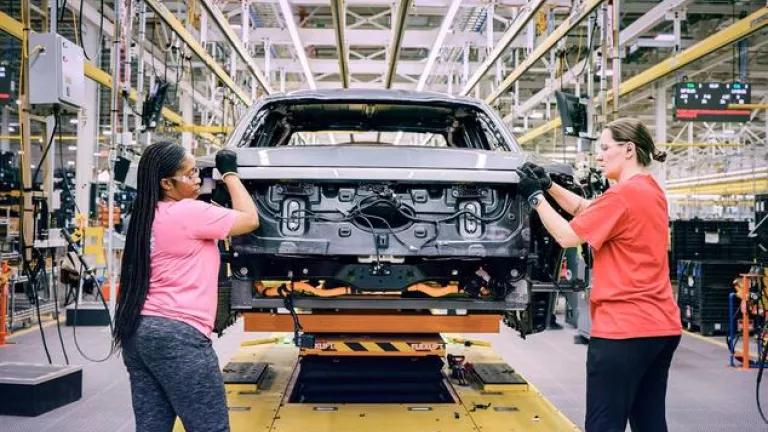U.S. Races Ahead in EV Manufacturing Investments
Since Biden took office, manufacturers have quadrupled their announced electric vehicle manufacturing and battery investments in the U.S. to $210 billion, more than any other country in the world.

Employees at Electric Vehicle Center on the grounds at the Ford River Rouge complex in Dearborn, Michigan
Ford Motor Company
The United States is now poised to attract the most investments globally in electric vehicle and battery manufacturing, for the first time surpassing announced investments in China and closing in on Europe. Companies have announced $210 billion of investments in the electric vehicle (EV) industry, up from just over $50 billion when President Biden took office in 2021, according to a NRDC commissioned report conducted by researchers at Atlas Public Policy.
After years in which China dominated electric vehicle manufacturing, this new data shows a dramatic turnabout: The U.S. is now on track to attract nearly a quarter of all announced global EV investments, second only to Europe.
The surge in these investments right after President Biden took office and made the transition to EVs a centerpiece of his administration demonstrates the benefits of strong clean car standards and federal support for zero-emitting vehicles.
In addition, industry is seeing the unprecedented commitment of the federal government in this global EV race with President Biden’s signing of the Inflation Reduction Act and Bipartisan Infrastructure Law. Collectively, the two laws make approximately $245 billion of federal investments available for electric vehicles, batteries, and charging stations, according to Atlas. Manufacturers are also responding to the administration’s commitment to strong clean car and clean truck standards, which will lock in progress on clean vehicles in line with what manufacturers are already seeing in Europe and China.

Cumulative Announced EV Investments by Region ($ Billions)
Building Batteries Here
The Atlas researchers also found that automakers and battery manufacturers have plans to spend $54 billion to construct or expand 37 EV battery manufacturing facilities across the country. If built and operating by 2030, these facilities would have the capacity to support approximately two thirds of the passenger vehicle market being electrified. These announcements mark a significant global shift, as the commercialization and production of lithium-ion batteries over the past three decades has been dominated first by Japan and then by China. It is a homecoming of the technology of sorts, as U.S.-based researchers over the 1970s and 80s helped to invent and develop lithium ion battery technology, one of whom received the Nobel Prize in Chemistry in 2019 for his contributions alongside others.

Planned Growth in EV Battery Facilities (GWh of plant capacity)
Locking Announced Investments Down
Ensuring these announced investments result in actual domestic projects – and don’t get shifted to other countries - will require the Administration to provide long-term regulatory certainty through clean car and clean truck standards together with successful implementation of the climate and infrastructure laws. Atlas researchers also note that “additional policy support at the state level could provide even greater confidence to the private sector and lock in additional investment in EV and battery manufacturing.” And, as my colleague writes, there is a historic opportunity for the U.S. to build batteries better by making these new supply chains circular and more sustainable through domestic investments in recycling, reuse, and reducing waste. The investments also present an opportunity for retooling factories, training and workforce development, and to support good paying union jobs.
Almost overnight, the U.S. is now poised to become a global leader in innovative, cleaner and cost-effective electric vehicle manufacturing. These record investments in a new, cleaner future can help boost the economy, create jobs in communities across the country, and help provide a cleaner and more affordable way of moving people and goods. Let’s get to work!

Employees working on electric buses at a Proterra manufacturing plant in Greenville, South Carolina.




